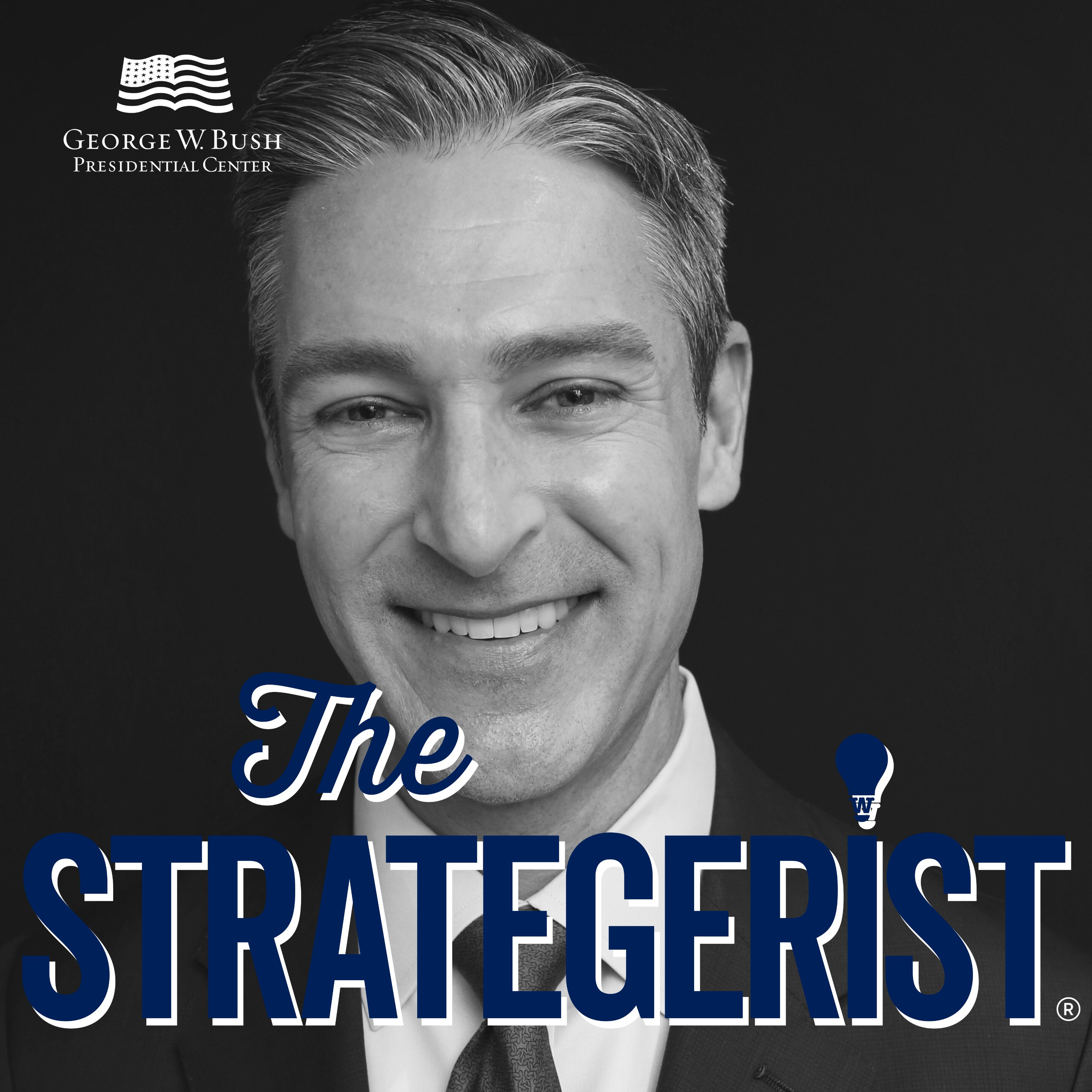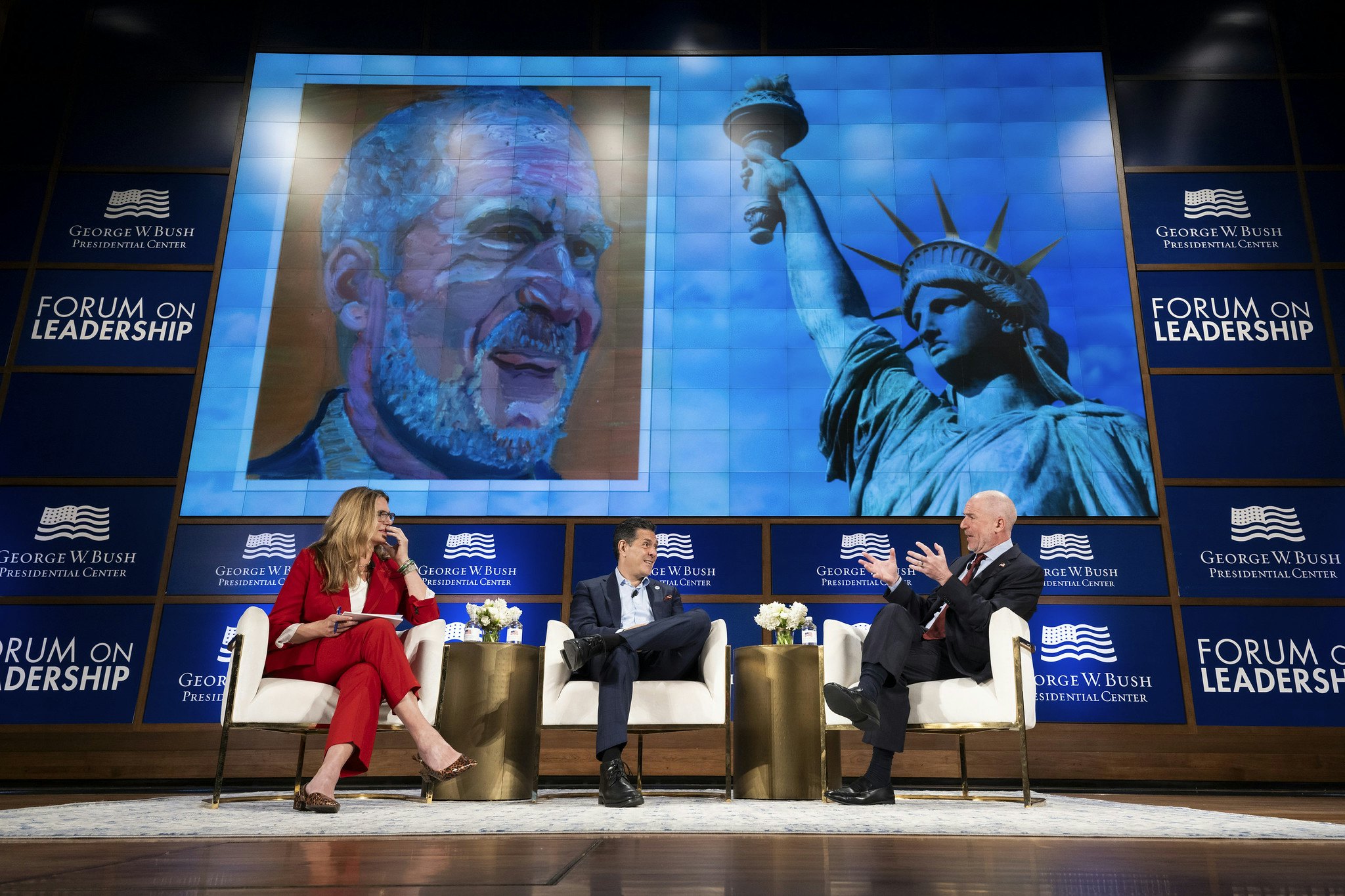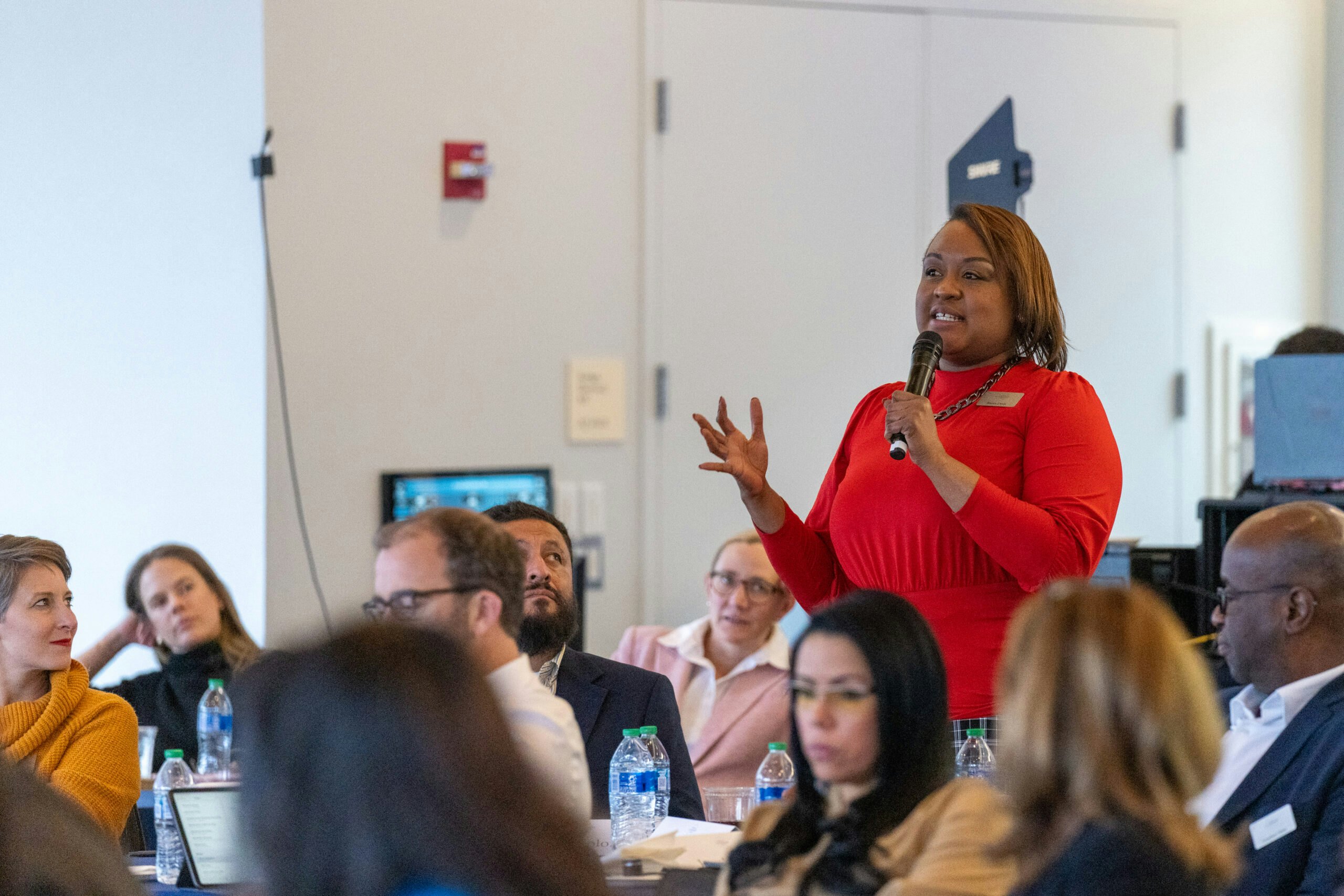Author and historian Anne Applebaum describes how democracy has not been the norm throughout history, cautions that we must watch the rise of foreign authoritarianism through propaganda campaigns, and recalls that no society, even a large one like the United States, operates as an island.
Anne Applebaum is a staff writer for The Atlantic, a historian whose book, Gulag: A History, won a Pulitzer Prize, and co-director of a project at the Johns Hopkins School of Advanced International Studies that focuses on disinformation and propaganda. The Yale University graduate splits her time between the United States and Poland, where she writes frequently about the challenges to democracies across Europe. Her latest book, The Twilight of Democracy: The Seductive Lure of Authoritarianism, debuts this summer.
In this email exchange with Lindsay Lloyd, the Bradford M. Freeman Director of the Bush Institute’s Human Freedom Initiative, Chris Walsh, senior program manager of the Bush Institute’s Human Freedom Initiative, and William McKenzie, senior editorial advisor at the Bush Institute, she describes how democracy has not been the norm throughout history. She cautions that we must watch the rise of foreign authoritarianism through propaganda campaigns. And she recalls that no society, even a large one like the United States, operates as an island.
You have written widely about the challenge that a rising authoritarianism presents democracies. The subtitle of your new book is even “The Seductive Lure of Authoritarianism.” What do you mean by that? And how do you see that seductive lure impacting European democracies?
The “seductive lure of authoritarianism” is something that I am afraid you will find in every society, and even every democracy, including ours in the United States as well as those in Europe.
All of us have become accustomed to the idea that democracy is somehow natural and normal; actually, in human history it is anything but normal. Some percentage of every society dislikes raucous debate and wants it shut down; many people prefer unity to division, homogeneity to diversity. The idea that the government keeps changing is unsettling, even intolerably unsettling for them.
In addition, there are always intellectuals, journalists, and writers who will broadcast and promote the superiority of a single leader, a unified ideology, and a false nostalgia for a supposedly more peaceful past, on behalf of politicians. My book is mostly about them.
I should say also, though, that the threat of foreign authoritarianism can be felt in a different sense too. A decade ago, the Russian government created a strategy designed to undermine Western democracies using the new propaganda tools made possible by the internet, not just social media but also fake websites, false organizations and news organizations that mimicked journalism but were in reality promoting narratives.
Using money that was effectively stolen from their own country and recycled abroad using the pliant Western financial system, they began supporting “far-right” and sometimes “far-left” or separatist political parties all across Europe, and indeed some fringe groups in the United States, too. Some of these groups already existed, like the National Front in France. Others, like the Alternative fur Deutschland (AfD) in Germany, they played a major role in helping to create.
It is not coincidental that all of these parties campaign against the Western organizations that restrict Russian corruption and limit Russian power in Europe, especially NATO and the European Union. But part of Russia’s goal is also just to disrupt democracy, in Europe and the U.S., so that it doesn’t seem appealing to Russians. That was the real goal of the major propaganda effort that they launched to elect Donald Trump, and it seems to be successful.
More recently, the Chinese have also joined these efforts, and have begun looking not only to have business influence in the West but political and cultural influence as well.
Protectionism, isolationism, and nativism are on the rise in many democracies, including here in the United States. How should democracies best respond to this inward turn?
I can certainly accept that it’s important, from time to time, for countries to rebalance, to shift the focus of national conversation away from foreign policy and towards the things that bother ordinary voters. It’s also clear that, in a world that has been changing so quickly, Western governments haven’t always offered people the sense of security and protection that they now miss.
I really like David Frum’s idea, described in his recent book Trumpocalypse, of a kind of grand left-right bargain that could help fix this: Create a universal healthcare system in the U.S., in exchange for restrictions on new immigration. That might satisfy offer some set of stability, and create some kind of agree-upon center ground.
Still, we cannot pretend as if any country, even one as large as the United States, is an island: If nothing else, the pandemic has shown us how profoundly integrated the world really is and how impossible it is to imagine we can somehow protect ourselves with a wall. I think political leaders need to spend more time explaining the purpose of international alliances and involvements, to show people how they bring advantages to the United States and its citizens.
I think political leaders need to spend more time explaining the purpose of international alliances and involvements, to show people how they bring advantages to the United States and its citizens.
Have elites in the worlds of government, media, business, education, and elsewhere failed to understand the anxieties that people in democracies feel about changes that are disrupting their way of life? If so, how should they address those anxieties?
I’ll answer that question the same way as the previous one: The answer must lie in a series of grand bargains like the one Frum describes, agreements to limit some kinds of change and offer people greater security. After decades of arguing for individualism and the importance of self-motivation, it’s time for government to start thinking harder about how to help people navigate the unbelievable complexities of modern life.
Beginning with universal health care — and continuing, perhaps, towards a universal basic income — we could begin to offer American citizens some sense that they belong to a community. European countries are of course far ahead on this issue, and have been for many decades.
I would add to that the importance of simply modernizing government. One of the other revelations of the pandemic is how ineffective and sloppy American bureaucracy has become, as compared, say, to the bureaucracy in South Korea or Germany. Investing in people, digitizing government services, creating online “passports” of the kind they have in Estonia that enable people to navigate banking, health care, and even government services online would also help give people the sense that they live in an effective state. If your government is sloppy, incompetent and wasteful, you cease to feel pride and confidence in it.
To what extent do you see a sense of lost national or cultural identity contributing to a resurgent authoritarianism in Central Europe? Is this sense of loss authentic, meaning it is coming from the bottom-up, or is manufactured and coming from the top-down?
I don’t think it’s “lost identity” so much as the fear of change, coupled with the resurgence of authoritarian instincts I described above. After all, there is no such thing as an “identity” that is stable or permanent. Identity can be redefined and, yes, manufactured. There is no inherent contradiction between being “Polish” and being “European” for example, unless you choose to think that there is.
At the same time, you could describe someone who moves from a country village to a city center, abandoning folk customs in favor of modernity, as having “lost” something – or as having gained something. Or both. It just depends on how you want to tell the story of your life.
Right now there are a number of politicians, on both the right and the left, who are seeking to use the widespread fear of rapid change and to play with these questions of “identity” for their own purposes. In a variety of ways, social media and other aspects of online culture encourage this thinking, since they use algorithms that force people into filter bubbles and feed them with anger and emotions they might otherwise not have.
Right now there are a number of politicians, on both the right and the left, who are seeking to use the widespread fear of rapid change and to play with these questions of ‘identity’ for their own purposes.
How do you assess the impact of the flow of people across borders on the stability of democracies?
It’s important to remember that this “flow of people” — a phrase that is already quite loaded — is the subject of quite a number of myths.
In Europe, for example, decisions taken by Germany’s Angela Merkel as well as other European leaders — in particular, through doing a deal with Turkey — have actually halted the numbers of refugees arriving on the continent quite dramatically. But even though the actual numbers have slowed to a trickle, anti-immigration politicians are still using this issue to create anger and division, and indeed to argue against Merkel.
Remember, also, that immigrants from ex-Yugoslavia, who spread out all across Europe during the wars there in the 1990s, did not create the kind of political backlash we see at present, even though their numbers were very high, even though many of them were Muslims. At that time, there weren’t politicians seeking to exploit fears of immigration in the same way.
Immigration is a profoundly important source of dynamism in all Western societies, and at all levels, from top scientists to healthcare workers. Racial, religious, and culture tolerance are also absolutely critical, fundamental values that must be respected if democracy is going to thrive; they improve the quality of life for everyone in a society, they make political debate and peaceful discussion possible.
Immigration is a profoundly important source of dynamism in all western societies, and at all levels, from top scientists to healthcare workers. Racial, religious and culture tolerance are also absolutely critical, fundamental values that must be respected if democracy is going to thrive; they improve the quality of life for everyone in a society, they make political debate and peaceful discussion possible.
Still, I do think that immigrants are more easily accepted and integrated when their numbers are lower and steadier, and when they enter through legal pathways. If we want to encourage immigration, we need to insure that it isn’t happening in a manner that is easily exploited by unscrupulous bigots.
What might be the impact on democracies in general and Central Europe in particular as America retreats from international leadership as well as from international institutions?
The effect has already been felt. The retreat of the U.S. has already emboldened pro-Russian, anti-NATO, anti-democratic parties and politicians all across Europe. As I’ve said, there are signs that the Chinese are now looking to buy political influence in the region as well.
The U.S., meanwhile, is not only uninterested in pushing back, it rewards some of those who assault democracy. Viktor Orban, who has dismantled democracy in Hungary and has complicated and corrupt relationships to both Russian and Chinese business, was welcomed with honor at the White House. Andrzej Duda, who signed legislation that packed the Polish courts and undermined Polish judicial independence, was received at the White House four days before the first round of an election. And the Trump administration has begun to dismantle the U.S. broadcasters — Voice of America, Radio Free Europe, Radio Free Asia — that have been our most important tool in countering foreign influence and disinformation.
At the same time, the administration’s lack of interest in international institutions has opened the door to greater Chinese, Russian, and other authoritarian influence. I’m just writing an article right now about how the problems at the World Health Organization are, in part, the reflection of American disengagement with the UN system. If we leave these international institutions, they won’t disappear, they will simply acquire different values. And then they might cause problems for us.
It took democracies several years to recover from the 2008 financial crisis. What impact might the coronavirus have on democratic societies with open markets?
It is just too early to make predictions. On the one hand, the coronavirus initially created a kind of panic that persuaded people to concede more power to the state. On the other hand, the months of lockdown also created a kind of anti-state backlash, which in the U.S. took the form of mass protests against police violence and racism.
Until this pandemic is over — and for all we know, it might last for many years — it’s impossible to judge exactly what impact it has. Remember that the political impact of 2008 wasn’t really felt until 2016, eight years later.




























